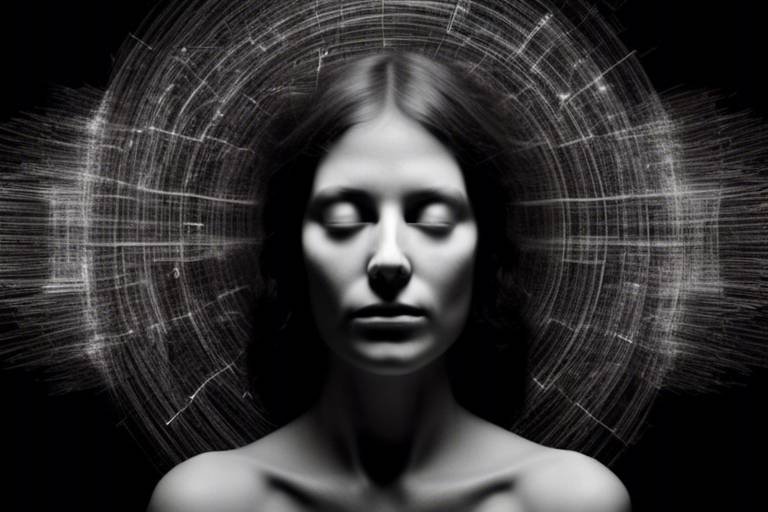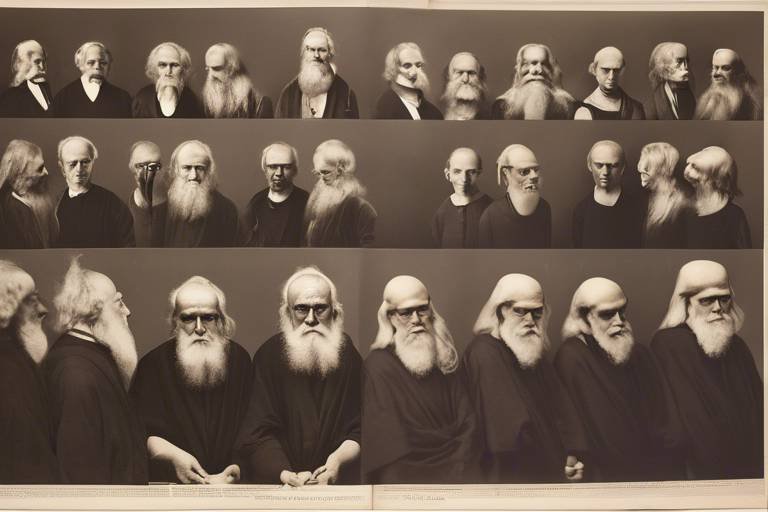The Theories of Mind and Metaphysics
Welcome to a fascinating exploration of the theories of mind and their intricate relationship with metaphysics. As we journey through this complex landscape, we will uncover the various perspectives that have shaped our understanding of consciousness, existence, and reality. Imagine standing at the crossroads of philosophy, psychology, and cognitive science—each path offering unique insights into the nature of the mind. How do our thoughts, feelings, and perceptions intertwine with the physical world around us? What does it mean to exist, and how do we define consciousness? These questions not only challenge our understanding but also ignite our curiosity about the very fabric of reality.
Theories of mind have evolved over centuries, influenced by key thinkers and cultural shifts. From the ancient Greeks to modern philosophers, each era has contributed to the rich tapestry of ideas that inform our current understanding. Dualism, physicalism, functionalism, panpsychism, and idealism are just a few of the prominent theories that we will explore in depth. Each theory presents a unique lens through which we can examine the mind-body relationship and the implications for our understanding of existence.
As we delve into these theories, we will also consider their critiques and the challenges they face. For instance, while dualism presents a clear distinction between mind and body, it raises questions about how these two realms interact. On the other hand, physicalism asserts that everything is fundamentally physical, yet struggles to explain the richness of subjective experiences. Functionalism shifts the focus to the roles mental states play, but can it truly capture the essence of consciousness? And then there's panpsychism, which suggests that consciousness may permeate all matter, challenging our conventional views of reality.
Throughout this article, we will not only examine these theories but also their implications for our understanding of consciousness and existence. What does it mean to be aware? How do our mental processes influence our perception of reality? By engaging with these questions, we hope to shed light on the profound mysteries of the mind and its connection to the universe.
So, buckle up as we embark on this intellectual adventure, navigating the intricate web of theories that define the mind and metaphysics. Whether you're a seasoned philosopher or a curious newcomer, there's something here for everyone. Let's dive in!
- What is dualism? Dualism is the theory that the mind and body are separate entities, each with distinct properties.
- How does physicalism differ from dualism? Physicalism asserts that everything, including mental states, is fundamentally physical, whereas dualism maintains a clear distinction between mind and body.
- What are the implications of functionalism? Functionalism focuses on the roles of mental states rather than their internal composition, reshaping our understanding of consciousness.
- What is panpsychism? Panpsychism is the view that consciousness is a fundamental feature of all matter, suggesting a deeper connection between mind and the physical world.
- How does idealism challenge traditional metaphysics? Idealism posits that reality is fundamentally mental or immaterial, leading to debates about the nature of existence and perception.

[Dualism]
Dualism is a fascinating philosophical concept that suggests the mind and body are not just interconnected but are, in fact, distinct entities. Imagine your mind as a vibrant, swirling cloud of thoughts, emotions, and consciousness, while your body is like a sturdy, physical vessel that carries it through life. This separation has deep historical roots, tracing back to philosophers like René Descartes, who famously declared, "Cogito, ergo sum" or "I think, therefore I am." Descartes' assertion laid the groundwork for dualistic thought, positing that the mind (the realm of thoughts and consciousness) is fundamentally different from the body (the physical realm).
Throughout history, dualism has sparked intense debates among philosophers, scientists, and theologians alike. Key proponents such as Plato and Descartes have argued that the mind possesses qualities that cannot be reduced to mere physical processes. This perspective raises intriguing questions about the nature of reality itself. If the mind is separate from the body, what does that say about our existence? Are we merely biological organisms, or is there something more profound at play?
In the metaphysical realm, dualism has significant implications. It challenges the notion that everything can be explained through physical processes alone. For instance, consider how emotions, thoughts, and consciousness influence our actions. If these mental states are indeed distinct from our physical being, then understanding the essence of reality requires delving deeper into the relationship between mind and body.
However, dualism is not without its critics. Some argue that this separation leads to a problematic view of human existence. For example, how can something non-physical interact with something physical? This conundrum, often referred to as the "interaction problem," raises questions about causality and the nature of existence. Critics of dualism posit that it complicates our understanding of consciousness and reality, suggesting instead that a more integrated approach may be necessary.
Despite these critiques, dualism has left an indelible mark on metaphysical discussions. Its influence can be seen in various fields, including psychology and cognitive science, where the exploration of consciousness continues to thrive. The ongoing dialogue surrounding dualism invites us to ponder profound questions about our nature and existence, urging us to explore the depths of the mind and its relationship with the physical world.
- What is dualism? Dualism is the philosophical view that the mind and body are separate entities, each with its own distinct properties.
- Who are the key proponents of dualism? Notable proponents include René Descartes and Plato, who argued for the distinction between mental and physical substances.
- What are the implications of dualism for metaphysics? Dualism challenges the notion that everything can be explained through physical processes, suggesting a deeper exploration of consciousness and reality.
- What are the critiques of dualism? Critics argue that dualism leads to complications in understanding interaction between the mind and body, raising questions about causality.

[Physicalism]
Physicalism is a fascinating philosophical stance that asserts that everything in the universe, including our thoughts, emotions, and consciousness, is fundamentally physical in nature. Imagine for a moment that your mind is like a computer, processing information and generating outputs based on the input it receives. This analogy encapsulates the essence of physicalism: it suggests that mental states are not some ethereal substance floating in a void but rather complex processes arising from physical interactions within the brain. This perspective has profound implications for how we understand consciousness and existence itself.
At its core, physicalism challenges us to reconsider the age-old question of what it means to be conscious. If everything is physical, then our subjective experiences—those fleeting moments of joy, sorrow, or even existential dread—must also have a physical basis. But how do we reconcile the richness of these experiences with a purely physical framework? It's a bit like trying to explain the beauty of a sunset using only the laws of physics; while you can describe the light waves and atmospheric conditions, you might struggle to capture the emotional resonance it evokes.
One of the central tenets of physicalism is its rejection of dualism, which posits that mind and body are separate entities. Instead, physicalists argue that mental phenomena are entirely reducible to physical processes. This reductionist approach leads to some intriguing questions:
- How do brain states correspond to mental states?
- Can we fully explain consciousness through neuroscience?
- What about the subjective quality of our experiences, often referred to as 'qualia'?
Despite its compelling arguments, physicalism is not without its challenges. One major critique is that it struggles to account for the subjective nature of experiences. For instance, consider the taste of chocolate. While we can analyze the chemical compounds and neural pathways involved in tasting chocolate, can we truly capture the essence of the experience itself? This question lies at the heart of the debate surrounding the adequacy of physicalism in explaining consciousness.
Moreover, the implications of physicalism extend beyond philosophy into the realms of psychology and cognitive science. Researchers are increasingly exploring how our understanding of the brain can lead to advancements in mental health treatment and cognitive enhancement. The physicalist viewpoint encourages a scientific approach to these issues, advocating for treatments grounded in biological understanding rather than metaphysical speculation.
In summary, physicalism presents a robust framework for understanding the mind and its relationship to the physical world. By asserting that everything is ultimately physical, it invites us to explore the depths of consciousness through the lens of science. However, as we delve deeper into the mysteries of the mind, we must remain open to the complexities and nuances that challenge a purely physical interpretation of our experiences.
- What is physicalism? Physicalism is the philosophical viewpoint that everything, including mental states, is fundamentally physical.
- How does physicalism differ from dualism? Unlike dualism, which posits that mind and body are separate, physicalism argues that mental phenomena are entirely reducible to physical processes.
- What are some challenges to physicalism? One major challenge is its difficulty in accounting for subjective experiences, known as qualia.
- How does physicalism relate to neuroscience? Physicalism encourages a scientific approach to understanding the brain and consciousness, leading to advancements in psychology and cognitive science.

[Functionalism]
Functionalism is a fascinating theory in the philosophy of mind that shifts our focus from the internal composition of mental states to their functional roles within a system. Imagine a car; it doesn't matter if it's a sleek sports model or a rugged SUV—what truly matters is how well it performs its functions, such as accelerating, braking, and steering. Similarly, functionalism posits that mental states should be understood based on the roles they play in our cognitive processes, rather than the specific materials or substances that constitute them. This perspective allows us to explore consciousness and mental processes in a more dynamic and adaptable way, making it a compelling framework in both philosophy and cognitive science.
One of the most appealing aspects of functionalism is its ability to bridge the gap between various disciplines. By focusing on the functions of mental states, functionalism aligns well with insights from psychology and neuroscience, which often emphasize the processes that underpin behavior and thought. For example, when we consider how a person reacts to a stimulus, functionalism encourages us to look at the processes involved—such as perception, decision-making, and action—rather than getting bogged down in debates about the physical substrate of the mind. This approach not only enriches our understanding of human cognition but also opens the door to exciting discussions about artificial intelligence (AI) and machine consciousness.
However, while functionalism offers a robust framework for understanding mental states, it is not without its critiques. One major point of contention is that functionalism may overlook the qualitative aspects of consciousness—often referred to as "qualia." For instance, consider the experience of tasting chocolate. While functionalism can explain the processes involved in tasting—like sensory perception and neural response—it struggles to capture the subjective experience of what chocolate actually tastes like. This limitation raises important questions about whether functionalism can fully account for the richness of human experience and consciousness.
In the realm of AI, functionalism has significant implications. If mental states are defined by their functions, then could machines, which perform similar functions to human minds, also be said to possess minds? This provocative question leads to a myriad of philosophical discussions about the nature of consciousness and the potential for machines to experience awareness. If a computer can process information, respond to stimuli, and adapt to its environment, does it possess a form of consciousness, even if it lacks biological components? These inquiries challenge our traditional views of mind and consciousness, pushing us to reconsider what it means to "think" and "feel."
In conclusion, functionalism reshapes our understanding of mind and metaphysics by emphasizing processes over substances. By focusing on the roles that mental states play within a system, functionalism provides a versatile framework that connects philosophy, psychology, and cognitive science. However, the challenges it faces, particularly regarding qualitative experiences and the implications for AI, highlight the ongoing debates in the philosophy of mind. As we continue to explore these questions, functionalism remains a pivotal theory that invites us to rethink the very nature of consciousness and existence.

[Critiques of Functionalism]
Functionalism, while offering a compelling framework for understanding mental states, is not without its criticisms. One of the most significant critiques revolves around its inability to adequately account for the qualitative aspects of consciousness, often referred to as "qualia." Qualia are the subjective experiences that accompany our perceptions—like the vividness of a sunset or the taste of chocolate. How can a theory that focuses solely on functions explain why a particular experience feels a certain way? This question leads to a deeper inquiry into the essence of what it means to experience something.
Many philosophers argue that functionalism reduces the richness of the mind to mere processes, neglecting the intrinsic qualities of experiences. Imagine trying to describe the taste of your favorite dish by only discussing the ingredients and cooking method. While those details are essential, they fail to capture the actual experience of savoring that dish. Similarly, critics of functionalism contend that understanding mental states purely through their functions overlooks the profound and personal nature of consciousness.
Moreover, there's a concern regarding the "multiple realizability" of mental states. This concept suggests that the same mental state can be realized in different ways across various systems. For instance, a human and an artificial intelligence might both exhibit behaviors associated with "pain," but the underlying experiences could be vastly different. Critics argue that if mental states can be realized in such diverse forms, then equating them solely based on their functions may lead to an oversimplified understanding of the mind.
Another critique stems from the implications of functionalism for artificial intelligence. If a machine can replicate human-like behavior, does it mean that it possesses consciousness? This question opens a Pandora's box of ethical and philosophical dilemmas. If machines can function like humans, how do we differentiate between genuine consciousness and mere simulation? This dilemma not only challenges our understanding of mind but also forces us to confront the ethical implications of creating entities that might experience something akin to consciousness.
In summary, while functionalism has reshaped our understanding of mental states by emphasizing their roles and processes, it struggles to address the qualitative, subjective nature of consciousness. The critiques it faces remind us that the mind is not just a collection of functions but a deeply intricate and personal experience. As we continue to explore the realms of philosophy and cognitive science, these discussions will undoubtedly evolve, prompting further inquiry into the nature of consciousness and existence.
- What is functionalism in the philosophy of mind? Functionalism is a theory that views mental states in terms of their functional roles rather than their internal composition. It emphasizes how mental states interact with one another and with the external environment.
- What are qualia? Qualia are the subjective, qualitative aspects of conscious experiences, such as the way a specific color looks or how a particular taste feels.
- Can machines experience consciousness? This is a debated topic. Functionalism suggests that if machines can perform similar functions as humans, they might possess a form of consciousness, but this raises ethical and philosophical questions about the nature of experience.
- What are the main critiques of functionalism? The main critiques include its inability to account for qualia, the issue of multiple realizability, and the implications for artificial intelligence.

[Functionalism in AI]
Functionalism, a theory that emphasizes the roles and functions of mental states rather than their internal composition, has profound implications for the field of artificial intelligence (AI). Imagine for a moment that your mind is akin to a sophisticated computer program. Just as software can perform various tasks without needing to understand the hardware it runs on, functionalism suggests that mental states can be understood by their functions. This raises the intriguing question: if machines can replicate these functions, could they possess minds of their own?
To explore this notion, let’s consider the key features of functionalism as they relate to AI:
- Task Performance: If an AI can perform tasks that require reasoning, learning, and problem-solving, does it not exhibit characteristics of a mind?
- Behavioral Equivalence: Functionalism posits that mental states are equivalent to the behaviors they produce. Thus, if an AI behaves like a human in certain contexts, can we attribute mental states to it?
- Contextual Flexibility: Just as human thoughts can adapt to different situations, functionalism allows for machines to adjust their responses based on input, suggesting a form of intelligence.
However, the implications of functionalism in AI extend beyond mere replication of human-like behaviors. It raises ethical and philosophical questions about consciousness and identity. If a machine behaves indistinguishably from a human, should it be granted rights or moral consideration? This dilemma is reminiscent of the famous Turing Test, which evaluates a machine's ability to exhibit intelligent behavior equivalent to, or indistinguishable from, that of a human. The deeper we delve into functionalism, the more we find ourselves grappling with the essence of what it means to be 'alive' or 'conscious.'
Furthermore, the rise of AI challenges our traditional understanding of mind and consciousness. For instance, consider the following table that outlines the distinctions between human minds and AI systems through the lens of functionalism:
| Aspect | Human Mind | AI System |
|---|---|---|
| Functionality | Complex emotional responses, creativity | Task-oriented, programmed responses |
| Learning | Experiential learning, intuition | Data-driven learning, pattern recognition |
| Consciousness | Subjective experience, self-awareness | Operational awareness, no subjective experience |
As we continue to develop AI technologies, the functionalist perspective offers a valuable framework for understanding how these systems might operate similarly to human minds. Yet, it’s crucial to remain aware of the limitations. While AI can mimic certain functions, it lacks the subjective experiences that define human consciousness. This distinction is vital as we navigate the future of AI and its integration into society.
In conclusion, functionalism in AI not only reshapes our understanding of what it means to have a mind but also challenges our ethical frameworks. As machines become more capable of performing complex functions, we must ask ourselves: are we ready to redefine consciousness in a world where minds might not be exclusively human?
- What is functionalism in the context of AI? Functionalism in AI refers to the theory that mental states are defined by their functional roles rather than their internal structure, suggesting that machines can possess minds if they perform similar functions as humans.
- Can AI truly possess consciousness? While AI can replicate certain mental functions, it lacks subjective experiences, making it debatable whether it can be considered conscious in the same way humans are.
- What ethical considerations arise from functionalism in AI? The ability of AI to perform human-like tasks raises questions about rights, moral considerations, and the nature of consciousness, prompting ongoing debates in philosophy and ethics.

[Panpsychism]
Panpsychism is a fascinating philosophical theory that suggests consciousness is not just a feature of complex brains but is instead a fundamental quality of all matter. Imagine for a moment that everything around you—rocks, trees, even the air you breathe—possesses some form of consciousness. It sounds a bit wild, right? But that’s the essence of panpsychism. This perspective invites us to reconsider our understanding of consciousness and its relationship with the physical world.
Historically, panpsychism has roots in ancient philosophies, but it has gained renewed interest in contemporary discussions. Think of it as a bridge connecting the realms of mind and matter, challenging the traditional dualistic view that separates the two. Proponents argue that if consciousness is a universal property, it could help explain the mystery of subjective experience, which has baffled philosophers and scientists alike for centuries. It raises profound questions: If everything is conscious, what does that mean for our interactions with the world? Are we sharing our existence with a multitude of conscious entities?
One of the key appeals of panpsychism is its ability to provide a more cohesive understanding of consciousness. By asserting that all entities have some level of awareness, it offers a solution to the “hard problem” of consciousness—why and how subjective experiences arise from physical processes. This perspective suggests that consciousness is not an isolated phenomenon but rather a continuum that exists across different forms of matter. It’s like viewing the universe as a vast tapestry where each thread, no matter how small, contributes to the overall picture of existence.
However, panpsychism is not without its critics. Some argue that attributing consciousness to inanimate objects dilutes the meaning of consciousness itself. How can we compare the consciousness of a human being to that of a rock? To address this, panpsychists often emphasize the idea of “micro-consciousness”—that all matter has some form of basic awareness that combines in complex ways to create the rich experiences we associate with higher organisms. This layering of consciousness can be likened to an orchestra, where each instrument (or entity) contributes to a symphony of awareness.
Furthermore, panpsychism challenges us to rethink our ethical responsibilities towards the environment. If we accept that all matter possesses some form of consciousness, it compels us to consider the rights and welfare of non-human entities. This perspective can lead to a more compassionate approach to nature, as we recognize the interconnectedness of all living and non-living things. In a world where consciousness is ubiquitous, our actions take on greater significance, urging us to act with mindfulness and respect.
In conclusion, panpsychism offers a radical yet compelling framework for understanding consciousness and its place in the universe. It invites us to explore the depths of existence, questioning our assumptions about what it means to be conscious. As we delve deeper into the mysteries of the mind and matter, panpsychism remains a thought-provoking avenue for both philosophical inquiry and scientific exploration.
- What is panpsychism? Panpsychism is the philosophical view that consciousness is a fundamental feature of all matter, suggesting that everything possesses some form of awareness.
- How does panpsychism differ from dualism? While dualism posits that mind and body are separate entities, panpsychism asserts that consciousness exists within all matter, blurring the lines between the two.
- Are there any criticisms of panpsychism? Yes, critics argue that attributing consciousness to inanimate objects can dilute the concept of consciousness and raise questions about the comparability of different forms of awareness.
- What implications does panpsychism have for ethics? If all matter is conscious, it may lead to a more compassionate approach to nature and a reconsideration of our ethical responsibilities towards the environment.

[Idealism]
Idealism is a fascinating philosophical viewpoint that asserts reality is fundamentally mental or immaterial. Imagine for a moment that the world around you, with its tangible objects and physical laws, is akin to a grand stage play where the actors and the script are composed of thoughts, perceptions, and ideas. This perspective flips the conventional understanding of existence on its head, suggesting that what we consider "real" is deeply intertwined with the mind's activity. The implications of idealism stretch far and wide, challenging our perceptions not just of reality but also of consciousness itself.
The roots of idealism can be traced back to ancient philosophy, but it gained significant traction in the early modern period, particularly through the works of philosophers like George Berkeley and Immanuel Kant. Berkeley famously asserted that "to be is to be perceived," encapsulating the essence of idealism: objects exist only in the context of our perceptions. This radical notion forces us to reconsider the nature of existence and whether the material world holds any independent reality outside our minds.
Idealism also raises intriguing questions about the nature of consciousness. If reality is primarily mental, what does that mean for our understanding of the physical world? Are our thoughts the primary building blocks of existence, or is there a material substrate that underlies our perceptions? These questions create a rich tapestry of inquiry that intertwines philosophy, psychology, and metaphysics.
One of the most compelling aspects of idealism is its ability to explain the interconnectedness of consciousness and reality. It posits that our experiences shape the world around us, creating a feedback loop between perception and existence. This perspective aligns with many modern interpretations of quantum mechanics, where observation plays a pivotal role in determining the state of matter. The idea that consciousness can influence reality is not just a philosophical abstraction; it has real-world implications that challenge the fundamental tenets of physics and metaphysics.
However, idealism is not without its critiques. Detractors argue that it dismisses the material world, leading to a solipsistic view where only one's mind is certain to exist. This raises significant questions about the nature of shared experiences and the objectivity of reality. If everything is merely a construct of our perceptions, how can we account for the consistency of physical laws and the shared experiences of multiple observers? These critiques fuel ongoing debates in both philosophy and science, pushing idealism to refine its arguments and address the complexities of existence.
In conclusion, idealism offers a profound lens through which to examine the nature of reality and consciousness. It invites us to ponder whether our perceptions shape the world or if there exists a reality independent of our minds. As we navigate these philosophical waters, we find ourselves contemplating not just the nature of existence but also the very essence of what it means to be conscious beings in a seemingly chaotic universe.
- What is idealism? Idealism is the philosophical theory that reality is fundamentally mental or immaterial, suggesting that objects only exist as perceptions in the mind.
- Who are the key proponents of idealism? Key figures include George Berkeley, who argued that "to be is to be perceived," and Immanuel Kant, who explored the relationship between perception and reality.
- What are the critiques of idealism? Critics argue that idealism dismisses the material world and leads to solipsism, questioning the objectivity of shared experiences.
- How does idealism relate to modern science? Idealism's emphasis on perception aligns with some interpretations of quantum mechanics, where observation affects the state of matter.

[Berkeley's Idealism]
George Berkeley, an influential 18th-century philosopher, is best known for his radical view that challenges our conventional understanding of existence. His philosophy, often summarized by the phrase "to be is to be perceived," posits that objects do not exist independently of our perception of them. In simpler terms, if something is not being observed, it essentially ceases to exist. This notion can be quite mind-bending, can't it? Imagine walking into a room and turning off the lights. According to Berkeley, once you shut your eyes, the room itself might as well vanish into thin air!
Berkeley's idealism stands in stark contrast to materialism, which asserts that physical objects exist regardless of our perception. He argued that our sensory experiences are the only reality we can truly know. This leads to a fascinating implication: the world is a collection of ideas, and these ideas are sustained by a divine observer—God. Berkeley believed that even when we aren't perceiving something, God is always there to perceive it, thus ensuring its existence. It’s like having a cosmic safety net that guarantees that the world doesn’t just blink out of existence when we close our eyes.
To better understand Berkeley's idealism, consider the following key points:
- Perception as Reality: According to Berkeley, all that we know comes through our senses. If something cannot be perceived, it cannot be said to exist.
- The Role of God: Berkeley introduces the idea of a divine perceiver, who keeps the universe in existence even when no human is observing it.
- Challenge to Materialism: His philosophy fundamentally challenges the notion that material objects exist independently of our perceptions.
Berkeley's ideas have sparked considerable debate and discussion in the realm of metaphysics. Critics often argue that if everything depends on perception, then how do we account for the consistency and predictability of the physical world? For instance, a tree falls in a forest—does it make a sound if no one is there to hear it? Berkeley would argue that it does, but only in the mind of God, who perceives all things. This leads us to an intriguing intersection between faith and philosophy, where the existence of the material world relies heavily on the existence of a deity.
Moreover, Berkeley's idealism raises important questions about the nature of reality and how we engage with the world around us. If our perceptions are the only things we can truly know, then what does that say about the objective reality we often take for granted? Are we merely observers in a grand play, where the script is written by our perceptions? This philosophical inquiry invites us to explore deeper into the essence of consciousness and existence.
In summary, Berkeley's idealism invites us to rethink our understanding of reality. By asserting that objects exist only as perceptions, he challenges us to consider the profound implications of our sensory experiences. It’s a thought-provoking perspective that continues to resonate in philosophical discussions today, encouraging us to question not just the world around us, but also our place within it.
- What is Berkeley's main argument in his idealism? Berkeley argues that objects only exist when they are perceived, and without perception, they do not exist.
- How does Berkeley's idealism differ from materialism? Materialism claims that objects exist independently of our perception, whereas Berkeley's idealism asserts that perception is essential for existence.
- What role does God play in Berkeley's philosophy? Berkeley posits that God is the ultimate perceiver, ensuring that the universe remains consistent and existent even when humans are not observing it.

[Critiques of Idealism]
While idealism presents a fascinating perspective on the nature of reality, it is not without its challenges and criticisms. One of the primary critiques is that idealism tends to dismiss the material world as secondary or even illusory. Critics argue that this viewpoint can lead to a form of solipsism, where only one's mind is assured to exist, raising questions about the existence of an external world independent of perception. This notion can be unsettling; if reality is merely a construct of our minds, what does it say about the objects and people we interact with daily?
Moreover, opponents of idealism often point to the success of the natural sciences, which rely heavily on the assumption that a tangible, material world exists. The advancements in physics, biology, and chemistry suggest that there are consistent laws governing the universe, which idealism struggles to accommodate. For instance, consider how scientific experiments yield predictable results based on physical interactions. If reality is purely mental, how can we explain the reliability of these physical laws?
Another significant critique arises from the argument of intersubjective experience. If reality is strictly a product of individual perception, how do we account for shared experiences? When multiple individuals observe the same event—say, a sunset or a concert—there is a collective agreement on the experience, suggesting that there is something external that is being perceived. This shared reality challenges the idealist view that objects only exist as perceptions within individual minds.
Furthermore, some philosophers argue that idealism cannot satisfactorily explain the persistence of objects over time. For example, when you leave a room, the furniture does not simply vanish because you are no longer perceiving it. This raises the question: if objects exist only as perceptions, what happens to their existence when they are not being perceived? This dilemma highlights a crucial limitation of idealism: the difficulty in reconciling the existence of an objective world with a purely mental framework.
To summarize, the critiques of idealism can be categorized into several key points:
- Dismissal of the Material World: Critics argue that idealism overlooks the significance of the physical world.
- Reliance on Natural Sciences: The success of scientific inquiry suggests a tangible reality that idealism struggles to explain.
- Intersubjective Experience: Shared perceptions challenge the notion that reality is solely a mental construct.
- Persistence of Objects: Idealism faces difficulties in explaining how objects exist independently of perception.
These critiques serve as a reminder that while idealism offers intriguing insights into the nature of consciousness and existence, it must also contend with substantial philosophical challenges. Engaging with these critiques not only enriches our understanding of idealism but also propels the ongoing dialogue in the realms of metaphysics and the philosophy of mind.
- What is idealism? Idealism is a philosophical viewpoint asserting that reality is fundamentally mental or immaterial.
- What are the main critiques of idealism? Critics argue that idealism dismisses the material world, struggles to explain shared experiences, and cannot account for the persistence of objects over time.
- How does idealism relate to consciousness? Idealism posits that consciousness shapes reality, suggesting that our perceptions play a crucial role in defining existence.
- Is idealism still relevant today? Yes, idealism continues to be a significant topic of discussion in contemporary philosophy, particularly in debates about the nature of reality and perception.
Frequently Asked Questions
- What is dualism and how does it relate to metaphysics?
Dualism is the philosophical perspective that posits the mind and body as two distinct entities. This theory has deep historical roots, with key proponents like René Descartes arguing for the separation of mental and physical substances. In metaphysics, dualism raises questions about the nature of reality, particularly how these two realms interact and influence each other.
- How does physicalism challenge our understanding of consciousness?
Physicalism asserts that everything, including our mental states, is fundamentally physical. This perspective challenges traditional views of consciousness by suggesting that all experiences can be explained through physical processes. However, critics argue that physicalism struggles to account for the subjective nature of experiences, often referred to as 'qualia'.
- What is functionalism and why is it significant?
Functionalism is a theory that defines mental states by their functional roles rather than their internal composition. This means that what matters is how mental states operate in the context of behavior and interactions. Functionalism reshapes our understanding of the mind by emphasizing processes over substances, making it a crucial perspective in both philosophy and cognitive science.
- What are the critiques of functionalism?
While functionalism offers valuable insights, it faces critiques for its inability to fully account for qualitative experiences. Critics argue that functionalism overlooks the subjective aspects of consciousness, which are essential for understanding the richness of human experience. This limitation sparks ongoing debates about the nature of mind and its relationship to the physical world.
- How does functionalism relate to artificial intelligence?
Functionalism implies that if machines can perform functions similar to human mental states, they could be considered to possess minds. This perspective raises intriguing questions about the nature of consciousness and intelligence, challenging us to rethink what it means to be 'mindful' in the age of advanced AI.
- What is panpsychism and its significance?
Panpsychism suggests that consciousness is a fundamental feature of all matter, implying that everything has some form of mental experience. This theory challenges traditional metaphysical views by proposing a more interconnected relationship between mind and the physical world, potentially offering new insights into the nature of existence.
- What does idealism assert about reality?
Idealism posits that reality is fundamentally mental or immaterial. This perspective emphasizes that our perceptions shape our understanding of existence, suggesting that the material world is secondary to the mind. Idealism invites us to reconsider the nature of reality and the role of consciousness in shaping our experiences.
- How did Berkeley's idealism influence metaphysical thought?
George Berkeley's idealism argues that objects exist only as perceptions in the minds of observers. This radical view has significantly impacted metaphysical thought by questioning the existence of a material world independent of perception, thus reshaping discussions about reality and knowledge.
- What are the critiques of idealism?
Critics of idealism argue that it dismisses the material world, leading to an overly subjective understanding of reality. These counterarguments contribute to ongoing debates within metaphysics, highlighting the need for a balanced view that considers both mental and physical aspects of existence.



















